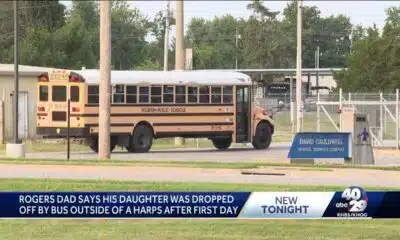News from the South - Alabama News Feed
Opinion | Measuring victory at the end of the war
SUMMARY: World War II ended in Europe 80 years ago without achieving its main goal: Poland’s sovereignty and independence. Instead of freedom, Poland shifted from Nazi occupation to Soviet control. Despite fighting bravely and enduring a two-front war against Nazi Germany and Soviet Russia, Poland was excluded from the post-war United Nations founding meeting due to Soviet influence. Stalin manipulated political agreements, established a puppet communist government, and rigged elections, denying Poland true self-determination. Poland’s sacrifices were overlooked for global stability, leaving a legacy of struggle until independence returned 45 years later. This history shapes Poland’s strong NATO military stance today.
The post Opinion | Measuring victory at the end of the war appeared first on www.alreporter.com
News from the South - Alabama News Feed
FBI raids Maryland home of Trump critic John Bolton
by Ariana Figueroa, Alabama Reflector
August 22, 2025
WASHINGTON — FBI agents raided the home and office of former Ambassador to the United Nations John Bolton, a one-time adviser to President Donald Trump who has become a frequent critic of the president, to investigate Bolton’s handling of classified documents, according to multiple media reports.
The raid on a former Trump adviser’s house represents an escalation from the Justice Department in targeting critics of Trump, whom he vowed to go after should he return to the White House for a second term.
Speaking to reporters Friday, Trump said he was not briefed on the raid of Bolton’s house in the wealthy suburb of Bethesda, Maryland, and office in Washington, D.C., according to White House pool reports.
But the president noted his longstanding feud with his former adviser.
“I’m not a fan of John Bolton,” Trump said. “He’s a real sort of a low life. He could be a very unpatriotic guy. We’re going to find out.”
Earlier this year, the president revoked the security detail for Bolton, who served as Trump’s national security advisor from 2018 to 2019 and as U.S. ambassador to the United Nations during the George W. Bush administration in 2005 and 2006.
Following his time in the Trump administration, Bolton, who was an important member of the Bush administration’s national security team that favored active military involvement in the Middle East, emerged as a chief Republican foreign policy critic of Trump, authoring a 2020 book that blasted the president and widened the public rift between the two men.
Bolton has not been charged with a crime and is not in custody, according to The Associated Press, which cited a person familiar with the matter.
The first Trump administration launched an investigation into Bolton to probe if he improperly used sensitive information in his book. The current search involves federal officials investigating Bolton’s actions over the last four years, according to the New York Times, which cited a federal law enforcement official.
Trump documents case
Trump himself was prosecuted for mishandling classified documents after the FBI raided his Florida golf course and main residence of Mar-a-Lago in 2022. A federal judge dismissed the resulting criminal charges against Trump.
FBI Director Kash Patel wrote on social media that “NO ONE is above the law,” and that FBI agents were “on mission.”
The FBI declined to comment.
In 2020, the Department of Justice opened a criminal investigation into Bolton’s book and tried to block its publication, but were stymied in court.
Patel also wrote a 2023 book where he lists Bolton, along with a dozen other people, as members of the “deep state” who are working against Trump, according to the Times.
Alabama Reflector is part of States Newsroom, a nonprofit news network supported by grants and a coalition of donors as a 501c(3) public charity. Alabama Reflector maintains editorial independence. Contact Editor Brian Lyman for questions: info@alabamareflector.com.
The post FBI raids Maryland home of Trump critic John Bolton appeared first on alabamareflector.com
Note: The following A.I. based commentary is not part of the original article, reproduced above, but is offered in the hopes that it will promote greater media literacy and critical thinking, by making any potential bias more visible to the reader –Staff Editor.
Political Bias Rating: Center-Left
This content presents a factual and detailed account of the FBI raid on John Bolton, a former Trump adviser turned critic, and provides context about Bolton’s history with Trump and his actions post-administration. It highlights the conflict between Trump and Bolton, includes direct quotes from Trump that are critical of Bolton, and references investigations into classified documents related to both men. While it covers perspectives from both sides and notes legal outcomes such as dismissed charges, it subtly emphasizes alleged abuse of power and retaliation by the Justice Department against Trump’s critics. This leads to a center-left lean, aiming for critical scrutiny of Trump and his administration while avoiding overtly partisan language.
News from the South - Alabama News Feed
Grants to boost local emergency alert systems in question as public media agency closes
by Jennifer Shutt, Alabama Reflector
August 20, 2025
WASHINGTON — The Corporation for Public Broadcasting will no longer administer a grant program that has so far provided millions of dollars to local television and radio stations to upgrade the equipment they use to send out emergency alerts.
The change comes after Republican lawmakers voted last month to defund the corporation, following a request from President Donald Trump to zero out more than $1.1 billion in previously approved spending for the organization.
Congress originally formed the Next Generation Warning System grant program in fiscal 2022 and provided the Federal Emergency Management Agency about $40 million during its first year.
FEMA then gave that money to CPB to reimburse stations for infrastructure and other improvements meant to get emergency alerts sent through the Integrated Public Alert and Warning System to more Americans.
That appears on track to change in the months ahead.
FEMA officials wrote in a notice of funding opportunity for the current fiscal year that the grants will now go directly to state and tribal governments that can then award funding to public broadcasting stations that make improvements to their emergency alert systems.
Democrats and some Republicans have raised concerns that without funding from the Corporation for Public Broadcasting, local stations wouldn’t be able to raise enough funding to remain in operation, potentially leading to holes in the country’s emergency alert system.
‘Rescission consequences’ for local public media
CPB, which plans to cease operations later this year, announced this week that it would no longer be able to administer the grant funding Congress approved during fiscal 2023 and 2024. The corporation had yet to determine which applicants would receive the funding lawmakers provided for those two years.
“CPB has been fully invested in the NGWS program and its mission to protect the American public,” CPB President and CEO Patricia Harrison wrote in a statement. “This is one more example of rescission consequences impacting local public media stations and the communities they serve—in this case, weakening the capacity of local public media stations to support the safety and preparedness of their communities.”
That could potentially leave much of the $136 million in grant funding approved by Congress in limbo.
CPB wrote in a statement that “FEMA should assume responsibility for disbursing the funds as Congress intended, or most of the FY 2022 funding—and all funds from FY 2023 and FY 2024—will go undistributed.
“As a result, critical emergency alerting equipment will not be purchased, leaving communities, especially those in rural and disaster-prone areas, without the upgrades Congress intended.”
A FEMA official, speaking on background, couldn’t say definitively how the agency would handle funding for those three fiscal years.
The White House and Office of Management and Budget did not immediately respond to requests for comment from States Newsroom on Wednesday about the grant program.
Projects funded so far include:
- Mid-South Public Communications Foundation in Cordova, Tennessee, which received $1.657 million to “replace a transmitter and two emergency generators to ensure the rural agricultural communities in Tennessee, Mississippi, and eastern Arkansas receive timely emergency communications.”
- Blue Ridge PBS in Roanoke, Virginia, which received $1.122 million to “replace critical broadcast infrastructure that will strengthen their signal in the mountainous region to reach more rural communities with targeted emergency alerts.”
- Louisiana Public Broadcasting, which received nearly $2 million to “install transmitters and antennas for KLTL-TV in Lake Charles and KLTM-TV in Monroe and update alerting equipment to enable statewide delivery of alerts and warning messages.”
Congress votes to end public media funds
Kate Riley, president and CEO of America’s Public Television Stations, released a written statement this week calling CPB’s inability to administer the grant program for FEMA “yet another devastating result of the rescission of public media funding.”
She also called on FEMA “to establish a new process for delivering this funding to public broadcasters” and urged “Congress to restore essential direct funding to local stations throughout this country whose communities depend on them for lifesaving public safety services, proven educational resources and essential community connections.”
Trump sent Congress a rescissions request in early June, proposing lawmakers eliminate previously approved funding for the Corporation for Public Broadcasting and several foreign aid accounts.
The House voted mostly along party lines to approve the full $9.4 billion proposal later that month. GOP senators, except Maine’s Susan Collins and Alaska’s Lisa Murkowski, approved a similar bill in July after removing spending cuts to the President’s Emergency Plan for AIDS Relief, or PEPFAR. The House voted to clear the revised legislation a few days later, sending the bill to Trump for his signature.
Alabama Reflector is part of States Newsroom, a nonprofit news network supported by grants and a coalition of donors as a 501c(3) public charity. Alabama Reflector maintains editorial independence. Contact Editor Brian Lyman for questions: info@alabamareflector.com.
The post Grants to boost local emergency alert systems in question as public media agency closes appeared first on alabamareflector.com
Note: The following A.I. based commentary is not part of the original article, reproduced above, but is offered in the hopes that it will promote greater media literacy and critical thinking, by making any potential bias more visible to the reader –Staff Editor.
Political Bias Rating: Center-Left
This content presents a critical view of the Republican-led defunding of the Corporation for Public Broadcasting and highlights concerns from Democrats and some Republicans about the negative impact on local emergency alert systems. It emphasizes the consequences of budget cuts initiated by former President Trump and Republican lawmakers, portraying these actions as harmful to public safety and local media. The overall tone and framing suggest a center-left perspective that supports public broadcasting funding and is critical of conservative fiscal decisions affecting it.
News from the South - Alabama News Feed
U.S. agriculture secretary announces end to subsidies for solar panels on farmland
by Sam Stockard, Alabama Reflector
August 19, 2025
This story originally appeared on Tennessee Lookout.
U.S. Agriculture officials announced a new initiative Monday to stop subsidies for solar energy panels that take up farmland while supporting cuts in agriculture grants to Tennessee universities.
Agriculture Secretary Brooke Rollins introduced the initiative by the Trump administration after a Future Farmers of America breakfast at the State Fairgrounds in Lebanon where she said the federal government will make new grants to bolster Tennessee farming while targeting grants that don’t help farmers’ production.
Rollins criticized the Biden administration’s Inflation Reduction Act and “market distorting incentives” for solar panels, which she said are eliminating Tennessee farmland.
The secretary made the statements even though a study by the nonpartisan Tennessee Advisory Commission on Intergovernmental Relations found that solar facilities aren’t likely to be the “primary driver” of development on farmland for decades. The study also determined that land can be returned to farming once a solar facility goes out of use.
Earlier this year, the federal government made dramatic cuts to higher education grants, including eliminating more than $31 million in funding to the University of Tennessee Institute of Agriculture, which houses agricultural research and resources for Tennessee farmers and communities in 95 counties.
Rollins defended the reductions, saying “Those cuts were being made in programs that did not align with the president’s vision of putting farmers first.”
Deputy Secretary Stephen Vaden of Tennessee described the reduction as a “repurposing” and said changes were made in research funding based on whether a grant “helps a farmer in the field make more money.” Projects aimed at “clean energy” or based on “racial criteria” were eliminated, he said.
In addition to stopping solar panel development on farmland, Rollins announced that nearly $89 million will go toward 13 rural development projects in 28 Tennessee counties to “promote partnerships” and infrastructure investments for rural education. The department has distributed nearly $100 million this year to more than 10,000 farmers through the Emergency Commodity Assistance Program, according to Rollins.
Some farmers have said they expect prices to increase because of President Donald Trump’s tariffs, which are forcing them to pass on higher rates to customers. Rollins said Monday the administration has signed eight new trade agreements expected to boost the nation’s economy.
Tennessee Lookout is part of States Newsroom, a nonprofit news network supported by grants and a coalition of donors as a 501c(3) public charity. Tennessee Lookout maintains editorial independence. Contact Editor Holly McCall for questions: info@tennesseelookout.com.
Alabama Reflector is part of States Newsroom, a nonprofit news network supported by grants and a coalition of donors as a 501c(3) public charity. Alabama Reflector maintains editorial independence. Contact Editor Brian Lyman for questions: info@alabamareflector.com.
The post U.S. agriculture secretary announces end to subsidies for solar panels on farmland appeared first on alabamareflector.com
Note: The following A.I. based commentary is not part of the original article, reproduced above, but is offered in the hopes that it will promote greater media literacy and critical thinking, by making any potential bias more visible to the reader –Staff Editor.
Political Bias Rating: Center-Right
The content presents a generally favorable view of policies and officials associated with the Trump administration, emphasizing support for traditional farming interests and criticism of the Biden administration’s approach to solar energy subsidies and grant allocations. While it includes some factual context and opposing data, the framing and focus on defending cuts to higher education grants and promoting rural development align more closely with center-right perspectives that prioritize agricultural production and skepticism of certain clean energy initiatives.
-
News from the South - Texas News Feed5 days ago
New Texas laws go into effect as school year starts
-
News from the South - Florida News Feed5 days ago
Floridians lose tens of millions to romance scams
-
News from the South - Kentucky News Feed6 days ago
AmeriCorps is under siege. What happens in the communities it serves?
-
News from the South - Florida News Feed6 days ago
Protesters go on strike in Israel demanding ceasefire and release of Gaza hostages
-
News from the South - Arkansas News Feed7 days ago
Rogers Public School bus drops student off at grocer store, father wants answers
-
News from the South - West Virginia News Feed4 days ago
Religious exemption debate front and center amid new school year in WV
-
News from the South - Missouri News Feed6 days ago
Three months since St. Louis tornado: How long will cleanup take?
-
News from the South - Georgia News Feed7 days ago
What do goats and Northfolk Sothern have in common? | FOX 5 News











































